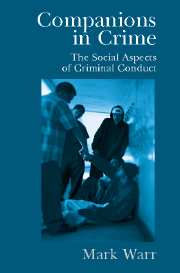4 - Peers and Delinquent Conduct
Published online by Cambridge University Press: 05 June 2012
Summary
Humans are a gregarious species, and the notion of peer influence is neither difficult to understand nor far removed from everyday experience. Few readers of this book could genuinely claim that their preferences and practices with respect to music, dress, politics, entertainment, or religion were acquired solely from their parents or developed wholly in isolation. Nevertheless, one investigator (Reiss, 1986) was entirely correct when he described the nature of peer influence as “murky.”
When it comes to understanding the role of peer influence in delinquent behavior, the principal difficulty confronting investigators lies in the sheer number and manner of ways in which peer influence may operate to encourage criminal conduct. Most criminologists who invoke the words “peer influence” probably have in mind several mechanisms of social influence, and those conceptions often vary considerably from one investigator to the next. My objective in this chapter is to sur vey the possibilities concerning the nature of peer influence, drawing where possible on existing evidence from the social sciences to inform the discussion and establish a case for each explanation.
The aim, however, is not to champion one explanation over another. Testing and adjudicating among these explanations is likely to require years of concerted effort from social scientists, and it would be premature at this point to select one theory over another. Rejecting a correct theory is no less serious than affirming a false one, and under the present state of evidence the risk of both errors is substantial.
- Type
- Chapter
- Information
- Companions in CrimeThe Social Aspects of Criminal Conduct, pp. 45 - 90Publisher: Cambridge University PressPrint publication year: 2002

